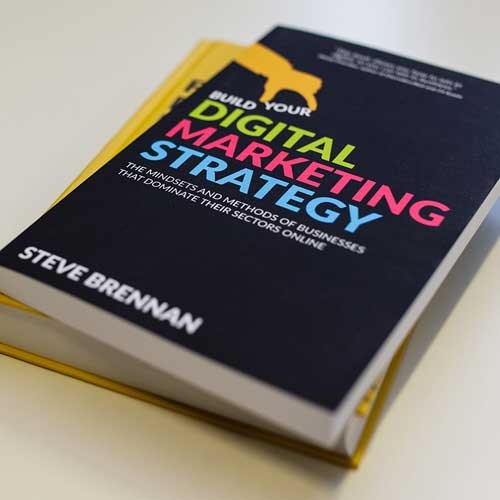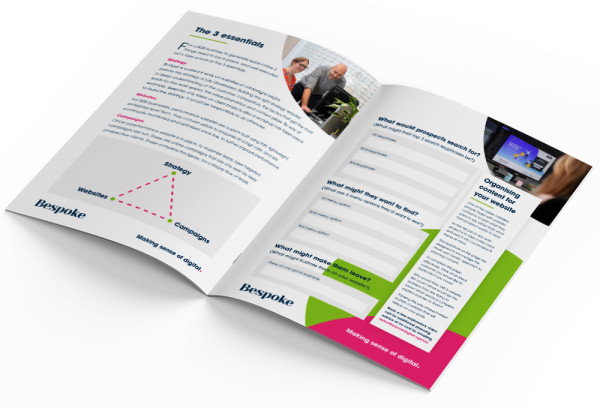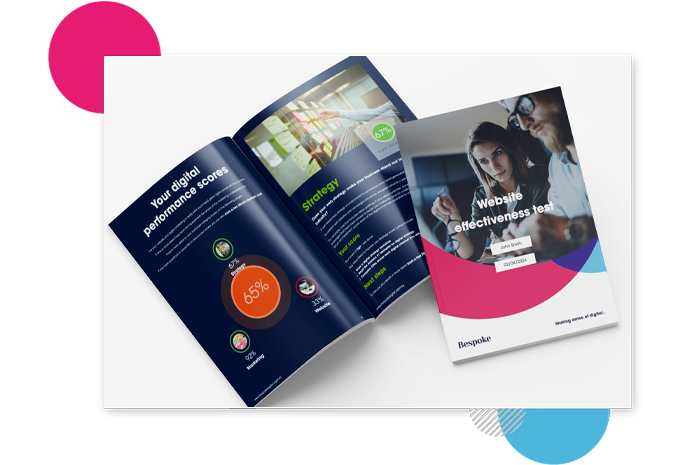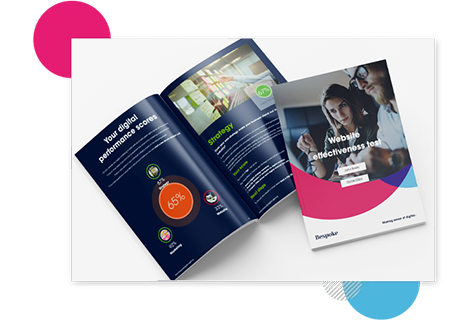We're often asked what the lifespan of a website is.
The answer is not as straightforward as you might think.
So today I'm sharing a thought process that helps answer this question.
The short answer
The short answer is easy: about every 3 years.
That's the average lifespan of websites for clients we manage.
And it makes sense - a proper web project includes a brand refresh, research on the target buyer and development of lead magnets that make visitors engage.
After 3-years a brand refresh is normally impactful, the target buyer profile has changed a little and new tech is available to generate leads more effectively.
So we always suggest planning for new websites to last 3-years.
In other words if the cost of the brand refresh and website project is around £30k, it costs around £10k per year for the website to act as an effective lead generator.
The longer (and more useful) answer
There are exceptions to the 3-year rule and understanding these will help you calculate when to replace your website:
1. When to replace a website before it's 3-years old
Imagine this scenario:
You invested in a new website 12-months ago and haven't had the leads you'd hoped for. If your website gave you just 10 good leads a month you'd be confident of converting these into customers, which would be worth £100,000s per year.
The website looks okay but just isn't converting - it has plenty of traffic but the quality or quantity of leads just isn't coming through.
In this scenario the website is likely the broken link in your lead-generation chain, or at least it's a link that isn't performing to its full potential. By way of example when we redesign and rebuild lead-gen websites we typically see uplift in the flow of leads of at least 15%, and an increase in lead quality, which is normally worth £100,000s.
So the point where the correct commercial decision is to replace a website is where the expected increase in revenue from improved lead flow is greater than the cost of the brand refresh and website project.
In other words, if the cost of the website project is around £30,000 and the expected uplift in leads that will result is in the £100,000s over the life of the website then the project should begin immediately regardless of the age of the website.
Every month the project is delayed, revenue is lost.
2. When to retain a website for longer than 3-years
In some cases - most often in larger businesses - deep work has been carried out over the life of a website to the extent that we can be confident it's performing close to its full potential even after 3-years.
For example, we might have been recording and analysing site visits with software such as Hotjar, we might have been running regular A/B tests on different parts of the website and making improvements based on results on an ongoing basis.
In this scenario we'll know that our website is functioning like a "well oiled machine" after 3-years, and through ongoing improvements we've updated and upgraded many of its features anyway, which have bought another year or two of its life.
In this case we might decide that a £30,000 brand refresh and website rebuild project is unlikely to generate any significant return on investment, and the decision to replace will likely be driven instead by replacing old tech, upgrading to a better and easier to use CMS, or upgrading in order to improve the security of the website.
But there's no lost revenue each month as a result of an underperforming website so the need to replace is less of an emergency for the business than in scenario 1.
The magic ingredient
The recurring issue we see is that a business is so close to its website it doesn't really know if it's working to its full potential or not.
So it always pays to have a third party audit or review your website and give a neutral view for you to consider.
We're an agency that's been building lead-gen websites for more than 20-years.
But we still outsourced the audit of our own brand and website as we know being challenged by experts outside of your business improves performance.
And like our clients, we saw sizeable uplift in incoming leads when we went live with our refreshed brand, refreshed website and refreshed campaigns.
Have you considered how buying websites can be like buying stocks & shares?
We discussed this idea with an in-house marketer client recently and they said it was a "lightbulb moment" for them.
So today I'm sharing the idea with you too.
How we buy shares on the stock market
There are normally over 1,000,000 trades per day on the London Stock Exchange.
Every purchasing decision is driven by expected future returns.
So when somebody decides to buy shares it's based on their assessment of what the shares are likely to deliver in return in the future.
To illustrate the point if we take investment advice it would always be on the lines of "X company, Y fund, or Z market are likely to give good returns".
We definitely wouldn't say to an advisor "I'd like to buy some shares, could you get me 3 quotes and let me know which are cheapest".
We'd get quotes that way for commodities of course - for example for our printer consumables, our office furniture, our IT equipment.
But not for something that's an investment, where the return is variable.
How we buy websites
The classic mistake is to think of websites as commodities when actually they are investments with variable returns just like stocks and shares.
Consider these 3 examples:
Web agency 1
Design & build cost: £35k
LTV of new business generated: £300k/pa
Web agency 2
Design & build cost: £50k
LTV of new business generated: £250k/pa
Web agency 3
Cost to design & build: £20k
New business generated over 3-years: £50k/pa
So over the 3-year life of the website option 1 returns £865k, option 2 returns £700k and option 3 returns £130k.
Option 1 is best and option 3 is by far the worst quote, even though it's the lowest design & build cost.
But how do we know where the best return is?
For B2B business with turnovers above £1m there are 5 factors that greatly increase the likelihood your new website will deliver truly great results.
The agency building it specialises in B2B sectors
Senior staff run the design process (including avatar and value prop sessions)
Design is driven by customer insights & data rather than your preferences
The website is built in an enterprise level system (ie not WordPress)
There are advanced lead-gen / lead-magnet tools in the website
So if we're looking at quotes and impressed with how the agency is presenting on these kinds of topics we've a high chance of a good return on the project.
If the agency presents poorly on these topics, or if we're buying based on price or some other factor, we should expect low impact from our new website.
It's a fascinating topic for sure.
And remember So, past performance of your website is not necessarily indicative of future performance...if you buy websites as investments!How we buy websites
The classic mistake is to think of websites as commodities when actually they are investments with variable returns just like stocks and shares.
Consider these 3 examples:
Web agency 1
Design & build cost: £35k
LTV of new business generated: £300k/pa
Web agency 2
Design & build cost: £50k
LTV of new business generated: £250k/pa
Web agency 3
Cost to design & build: £20k
New business generated over 3-years: £50k/pa
So over the 3-year life of the website option 1 returns £865k, option 2 returns £700k and option 3 returns £130k.
Option 1 is best and option 3 is by far the worst quote, even though it's the lowest design & build cost.
But how do we know where the best return is?
For B2B business with turnovers above £1m there are 5 factors that greatly increase the likelihood your new website will deliver truly great results.
The agency building it specialises in B2B sectors
Senior staff run the design process (including avatar and value prop sessions)
Design is driven by customer insights & data rather than your preferences
The website is built in an enterprise level system (ie not WordPress)
There are advanced lead-gen / lead-magnet tools in the website
So if we're looking at quotes and impressed with how the agency is presenting on these kinds of topics we've a high chance of a good return on the project.
If the agency presents poorly on these topics, or if we're buying based on price or some other factor, we should expect low impact from our new website.
It's a fascinating topic for sure.
And remember So, past performance of your website is not necessarily indicative of future performance...if you buy websites as investments!How we buy websites
The classic mistake is to think of websites as commodities when actually they are investments with variable returns just like stocks and shares.
Consider these 3 examples:
Web agency 1
Design & build cost: £35k
LTV of new business generated: £300k/pa
Web agency 2
Design & build cost: £50k
LTV of new business generated: £250k/pa
Web agency 3
Cost to design & build: £20k
New business generated over 3-years: £50k/pa
So over the 3-year life of the website option 1 returns £865k, option 2 returns £700k and option 3 returns £130k.
Option 1 is best and option 3 is by far the worst quote, even though it's the lowest design & build cost.
But how do we know where the best return is?
For B2B business with turnovers above £1m there are 5 factors that greatly increase the likelihood your new website will deliver truly great results.
The agency building it specialises in B2B sectors
Senior staff run the design process (including avatar and value prop sessions)
Design is driven by customer insights & data rather than your preferences
The website is built in an enterprise level system (ie not WordPress)
There are advanced lead-gen / lead-magnet tools in the website
So if we're looking at quotes and impressed with how the agency is presenting on these kinds of topics we've a high chance of a good return on the project.
If the agency presents poorly on these topics, or if we're buying based on price or some other factor, we should expect low impact from our new website.
It's a fascinating topic for sure.
And remember So, past performance of your website is not necessarily indicative of future performance...if you buy websites as investments!












